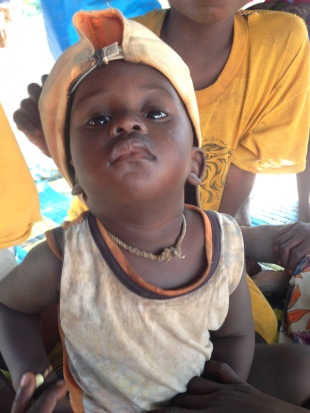When I was a kid in Sunday school we learned the old testament tale of Abraham and Isaac. Abraham was very old and had no children, so when God blessed him with a son, Isaac, it was a true miracle. Abraham loved Isaac with his whole heart. Then one day, God decided to test Abraham. Genesis 22 is the account of Abraham’s test. God came to Abraham and told him to take Isaac to another land, and sacrifice him on a mountain. Abraham did as he was told and took Isaac to the mountain that God pointed out to him. Abraham built the altar and placed Isaac upon it, But when Abraham reached for his knife the angel of the lord called to him and said,
“Do not lay a hand on the boy. Do not do anything to him. Now I know that you fear God, because you have not withheld from me your son, your only son.”
When Abraham looked up he saw a ram stuck in a thicket. He sacrificed the ram in the place of his son and rejoiced in the goodness of God. The angel of the Lord came to Abraham a second time and said,
“I swear by myself, declares the Lord, that because you have done this and have not withheld your son, your only son, I will surely bless you and make your descendants as numerous as the stars in the sky and as the sand on the seashore. Your descendants will take possession of the cities of their enemies, and through your offspring all nations on earth will be blessed,because you have obeyed me.”
Abraham went from that place, and as the angel promised he lived a prosperous life with his son.
So what the heck does this bible story have to do with my Peace Corps service in Senegal? Tabaski, baby! Tabaski or Eid al-Adha, is a massive celebration of Abraham (Ibrahim’s) willingness to sacrifice his son, and God’s (Allah’s) goodness in providing Abraham with a ram in Isaac’s (Ishmael’s) place. As you can tell, the name’s are slightly different, but the story is the same. Abraham was faithful and willing to sacrifice what meant most to him.
So what exactly is Tabaski? Basically, Tabaski is a big party. Typically it is a three-day event. Because the holiday is based on the Islamic calendar, it is not completely certain what day the festivities will begin. If you read my post on Ramadan and Korite it is the same concept. Everything depends on the lunar cycle. So in order to describe Tabaski as best as I can, I’ll start a month before the actual event.
There is a phrase that I heard a lot leading up to Tabaski, “Dangay prepare Tabaski?” or “Are you preparing for Tabaski?”. Preparing for Tabaski is a big task, especially for women. Everyone is expected to get new clothes made for Tabaski. I’m not talking just a simple new outfit. Tabaski outfits are fancy, and generally expensive. Fabric has to be purchased far in advance, and you have to give your tailor plenty of time because this is the busiest time of the year for them. It is very common for a woman to spend 50 to 100 dollars on a new outfit. That is very common in America, but basically unheard of here. On top of that, all women and girls get their hair done, many with fake hair which can get expensive. They also like to have new shoes, and all new jewelry. All of that adds up very quickly, especially when a family has a lot of girls!
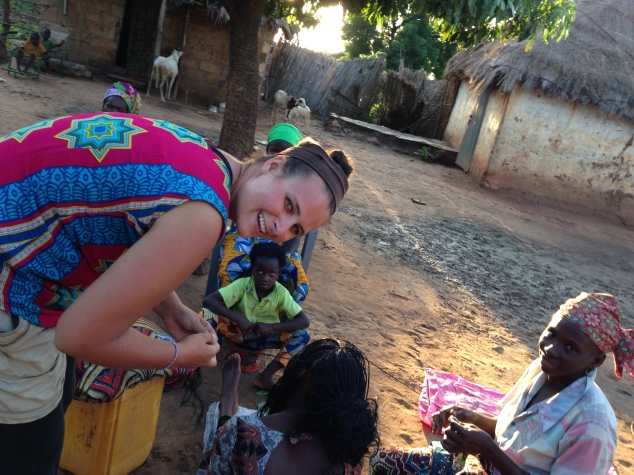
I amazed my family by helping them braid this girls hair! My Aunt would tie and braid in the fake hair and stop at about three inches, then I would take over. The whole process took two days! I only helped for a few hours, but I can’t imagine sitting that long to get my hair done.
Men also get new outfits made, usually with the best and most expensive fabrics, but the biggest thing men do for Tabaski is to buy a ram for the “sacrifice feast”. Each male head of the household is expected to buy a ram for Tabaski. In many cases, especially in rural areas, men do not have the money for a ram, so goats are a cheaper alternative. Men that are more wealthy very often buy multiple rams. In the weeks leading to Tabaski, I definitely noticed a rise in the amount of rams that I saw on a daily basis. One day I saw a horse cart traveling from village that was loaded down with at least 7 rams. Those carts aren’t that big either! Rams and goats are put on the tops of cars and busses in order to get them where they need to go. It is definitely an interesting sight to see!
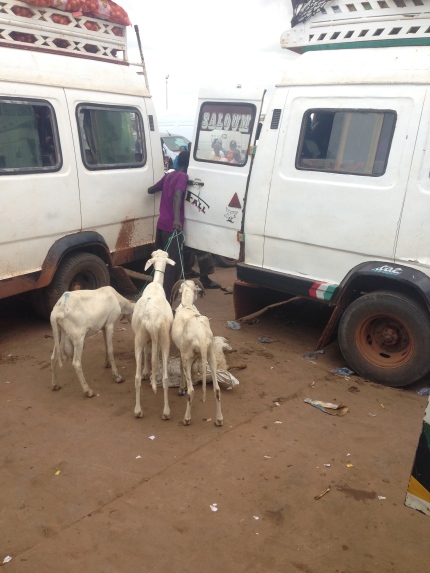
Sheep waiting to be loaded on the top of these busses. The car owners tie the animals legs, or put them in rice sacks with their heads sticking out.
About 5 days before Tabaski I went to my regional capital to do some work. I walked through the market on the way to our regional house to pick up some supplied for lunch, and I was absolutely amazed..and a little afraid. The market was packed! Taxis were bumper to bumper and no one was moving. Daring motorcyclist were weaving in and out of cars and people. Supply trucks were everywhere unloading things like potatoes, onions, mayonnaise, garlic, and various seasonings. I got the things that I needed and quickly retreated to one of the less busy side streets. I can only imagine what that same market looked like the day before Tabaski began!
The few days before all of the events my host father went to the larger village about 3 miles from ours and purchased potatoes, oil, vinegar, mustard, and the holy trinity of flavoring in Senegal… garlic, onions, and Adja powder. Here is an interesting tidbit of information, the price of staple goods needed for Tabaski sprockets around Tabaski. Supply and Demand y’all! Pair that with the fact that vegetables are already expensive during rainy season, and you’ve got a very expensive bowl of onion sauce.
Tabaski: Day One
Like many other events in Senegal, the first day of Tabaski was very anti-climactic. In the morning the men go to pray all together. Men in my village went to the larger mosque in the next village. As soon as they returned from their prayers, they began preparing their animals. My uncle dug a hole in the middle of our compound and I realized that they were going to kill the animals right there where we normally eat lunch. My father pulled out his new knife which he told me he spent a whole 2,000 CFA on. This is about $4.00, which may not seem like a lot for a big knife used to kill sheep, but it is a lot to pay for a knife in Senegal! Each male head of the household brought their animals over and tied them to the fence. My brother had the biggest ram, and my uncle had a second slightly smaller ram. My father and two other uncles each had a goat. I am not exactly sure if there is a particular order that the animals should be killed in, but they killed my brothers big ram first, then the goats in descending size, then the smaller ram. I didn’t watch when they were slitting the animals throats, but I definitely feel like I got enough of the experience.
Once the animals were dead and most of their blood drained, each man took his animal to a different place to skin and clean it. I stayed away from those areas too..weak stomach. Not too long after that, my brother, father and uncle gathered with their meat and began dividing it. The meat is typically split into three parts. One third for the family, one-third to be shared with friends, family, and community members, and one third for the poor. Since I live in a small village, it was more of a half and half for our family and for other families in the village. They divided the meat into neat little portions of different cuts of meat, including stomach and intestines. Then they sent one of the older boys in the family to distribute the piles to other families. Throughout the morning, may boys were coming and going offering their meat to us. So in the end, you basically get your whole animal back through other people.
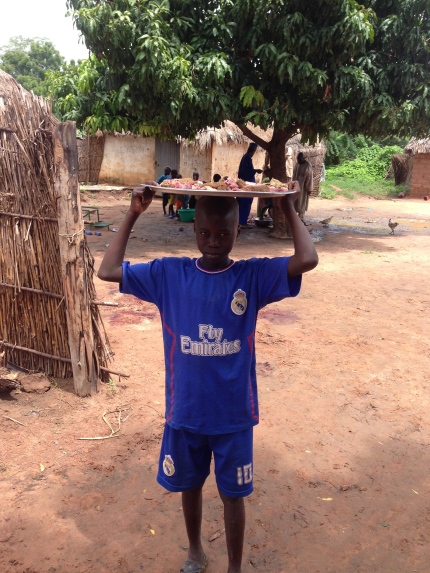
My cousin with his platter of meat to take to other families in the village.
The liver is kept separate and is cooked first. My mother cooked our ram’s liver in my room on my small gas cooking unit, and then my father offered me a portion of the meat. Since I’m not an expert in the cooking of ram, I respectfully declined. But maybe next year!
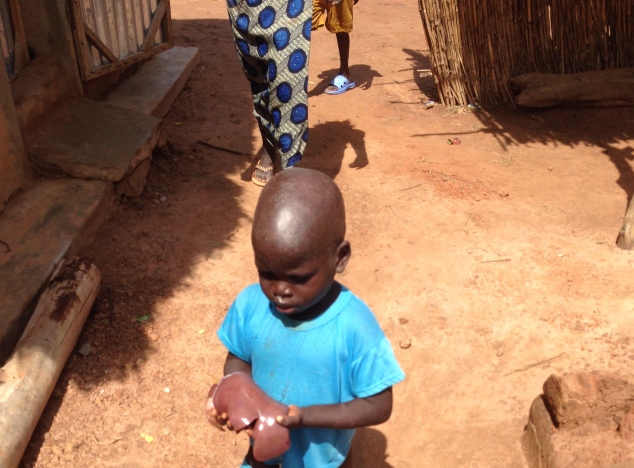
Probably one of the funniest and most surprising moments of my service was when my three-year old cousin Aliou came around the corner with a full ram liver in his hands. That thing is almost as big as his head! Almost…he has a big head 😉
Once all the meat was distributed it was around 12:30. The women of the families began to prepare the meat. Instead of having lunch at the normal 2:00 time, people just eat meat around 1pm. While the meat for lunch is cooking, women begin to cut the onions and potatoes for the 4:00 meal. On the first day of Tabaski I cut eight pounds of onions and three pounds of potatoes. All of this with no cutting board. Lets just say I bet I can cut an onion faster than with just my two hands and knife than any of you reading this could in an American kitchen.
Senegalese Tip: When you start cutting onions, take a generous piece of onion and place it in your head scarf, or just on your head and you won’t cry or get a runny nose. lol. If only that actually worked, but I still find myself doing it every time!
After a couple of hours of chopping and cutting I took some time to go get the bread that I had ordered from my brother, the local baker, earlier in the morning. My father told me to buy 20 loaves. Each loaf of bread is 100CFA. So naturally I payed 2000CFA for 20 loaves of bread. remember that knife my dad bought for 2000CFA? Yep. $4 bought 20 loaves of bread. That is just so crazy to me! Once the bread was picked up, my jobs for the day were done, so I took some time to relax. All the men and boys were getting hair cuts and the little girls were getting dressed in their pretty new cloths. My mom brought my personal bowl of ‘lunch’ to my room around 4:30.
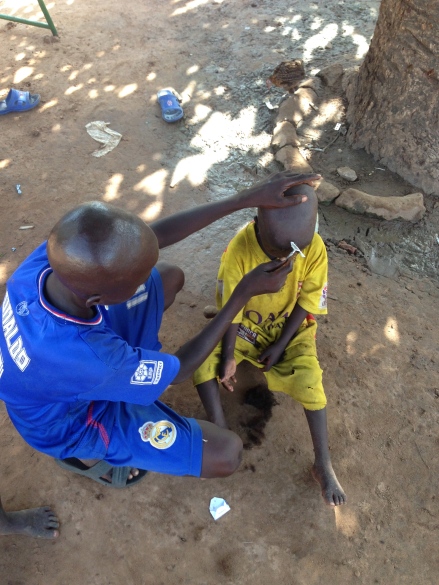
My cousin shaving his younger brothers head. All the boys got hair cuts, and even some of the older men.
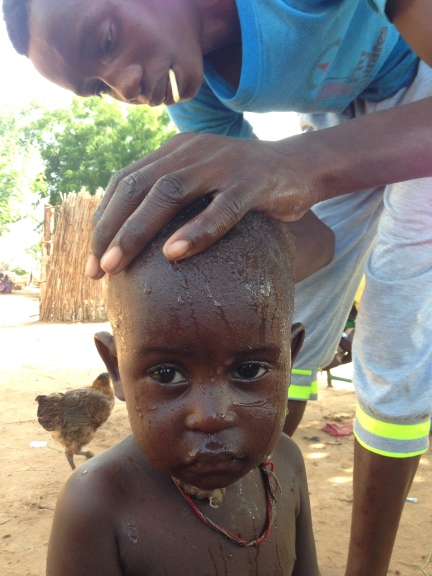
Baby Omar getting his hair done! This has to be one of my favorite pictures thus far!
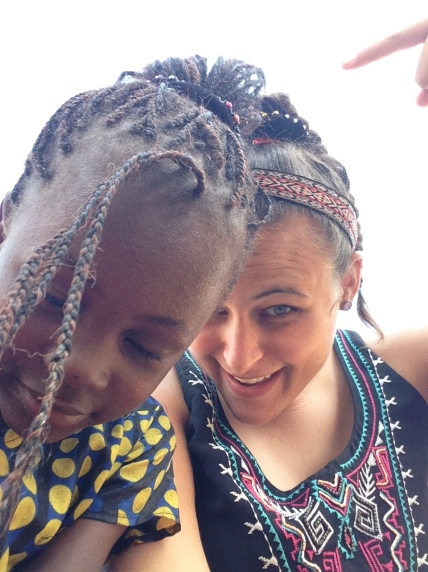
I bought my niece, Fatu and I matching hair scrunchies! She loved it, and so did I! PS they were less than 25 cents each..so if you want one..I can hook you up. 😉
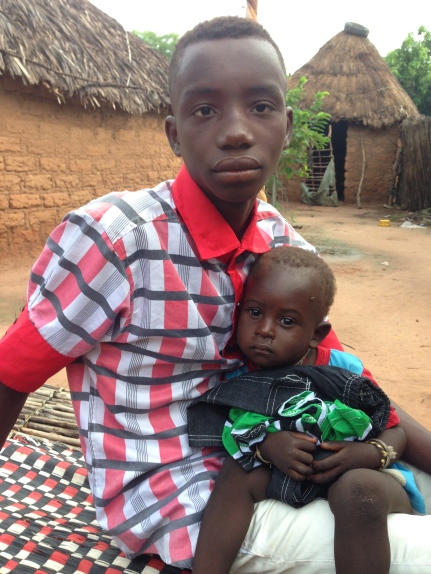
My younger brother and baby Omar hanging out on the morning of Tabaski.
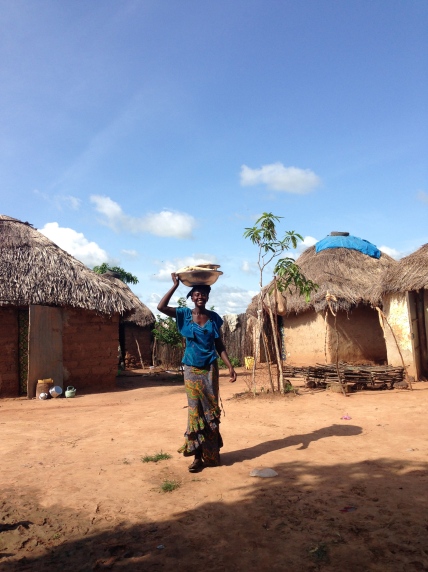
My sister-in-law, Nyakkanah, bringing lunch out for the men and the children.
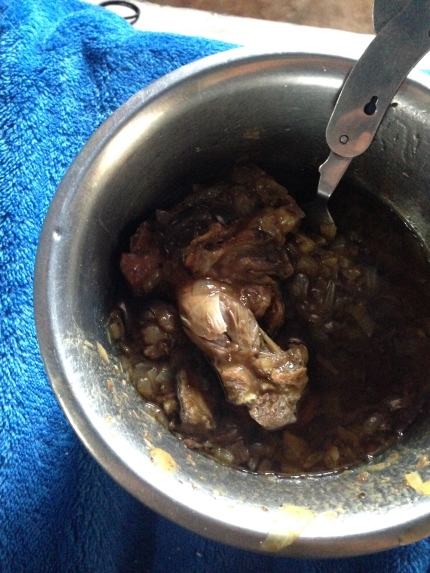
My lunch bowl had so much meat! The sauce was onion sauce with chucks of potatoes. This is served with bread so you can make a nice meat and sauce sandwich.
Similar to Korite (end of Ramadan feast) all of the women and older girls ate in their own area. They put on their fancy clothes and all bring their bowls to eat together under a neem tree. I went along to give everyone candy when they were done eating. The rest of the day was fairly normal. I helped my sister pound millet for dinner, and played with the kids until around 7 when I normally shower and change into comfortable clothes.
Tabaski: Day Two
Day two of Tabaski is exactly the same as day one, except the morning activity of sacrificing the animals is already done. I cut more onions and potatoes, bought more bread, and ate more onion sauce with chunks of meat.
Night time is different on day two though. This is one night when kids get to go around to differnt houses in the village and ask for small coins, candy, or anything else someone wants to give them. This is not unlike our Tick or Treat in America on Halloween. I gave kids little candies, and the word quickly spread that Khodia was giving out candy! But it was very fun!
Tabaski: Day Three
Day three is exactly like day two except along with the kids asking for things, there is also a little dance with the women around 6pm. Everyone in a circle with a few women beating on plastic buckets and metal bowls with their rubber shoes. It is a blast, but can also easily give you a headache!
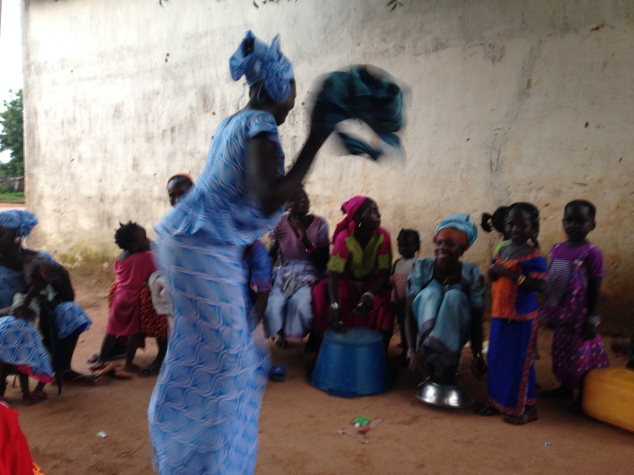
Fatu getting down at the dance! In these dances, the dancer controls the music. If she speeds up, the drummers speed up, and if she ‘backs it up’ they know she is almost finished and end it with a few hard beats, and a lot of laughs from the crowd!
By day three most of the meat has been eaten, but some may be left over depending on how much you had in the first place. My family had some left and continued to eat a little meat with every meal until it was gone. This was a total of five days where every meal contained meat!
Tabaski: Wrap up
If you have made it this far, I congratulate you! I am obviously not a person of few words. But to sum it all up, my first Tabaski was an awesome experience. I learned a lot about Islam, and had a lot of fun with my family. I tried to ask a lot of questions, and I found that in some cases the real meaning of Tabaski has been lost, especially for women and children. Sound familiar? When I asked some people why we have Tabaski it took them a while to get to the story of Abraham and Isaac. While Senegal is still part of the developing world, its people have certainly succumbed to materialism in some ways. The holiday was a lot about having new clothes, shoes, jewlery and hair. But this fact also made me think a lot about consumerism in America. Here, the only time people do get nice, new clothes is for big events like this. In America, if I wanted to, I could go out and buy a new outfit just because I am bored on a Saturday afternoon. So if you only got a new outfit once a year, wouldn’t you be excited about it too?!
This experience has been a world of new opportunityies and knowledge for me. It is hard, and very different from what I am used to, but I am thankful that I get to do it, and share my experiences with anyone who cares to listen! Bon Tabaski y’all!





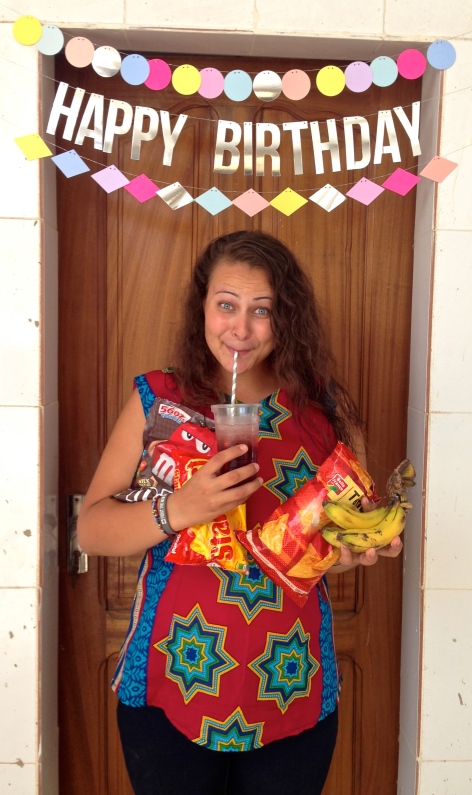 Today is my 23rd Birthday. Today also marks 9 months in Senegal. To put that in perspective.. I could have had a baby in that time. Guys…a baby. Don’t worry, I don’t yet have a child, and don’t plan to any time soon. But in all seriousness, I have grown more in the last 9 months, been pushed to my limits, and learned more about myself than I could possibly describe. I can only hope that the change is for the better and that it will stick around long after I leave Senegal.
Today is my 23rd Birthday. Today also marks 9 months in Senegal. To put that in perspective.. I could have had a baby in that time. Guys…a baby. Don’t worry, I don’t yet have a child, and don’t plan to any time soon. But in all seriousness, I have grown more in the last 9 months, been pushed to my limits, and learned more about myself than I could possibly describe. I can only hope that the change is for the better and that it will stick around long after I leave Senegal.






